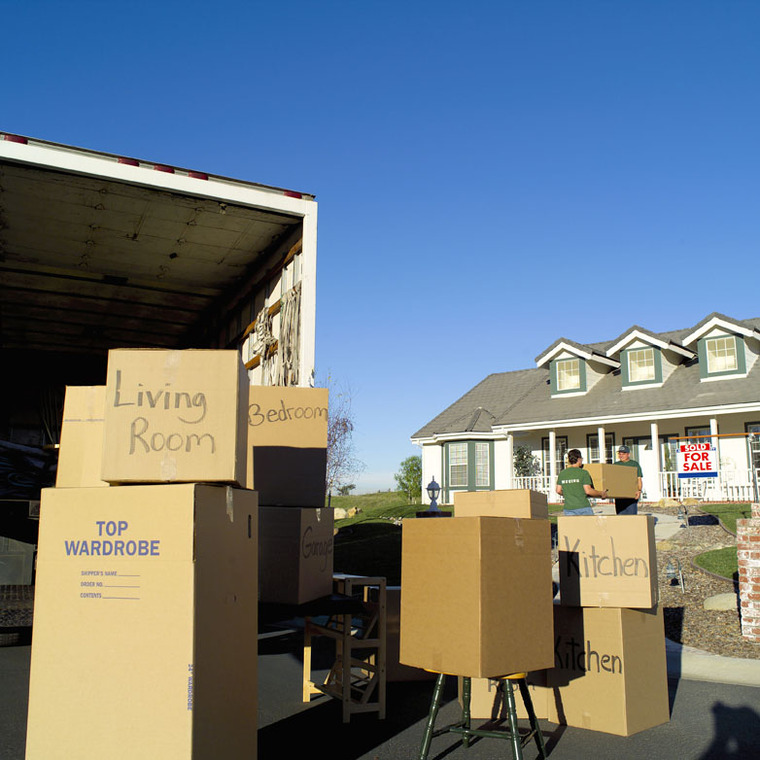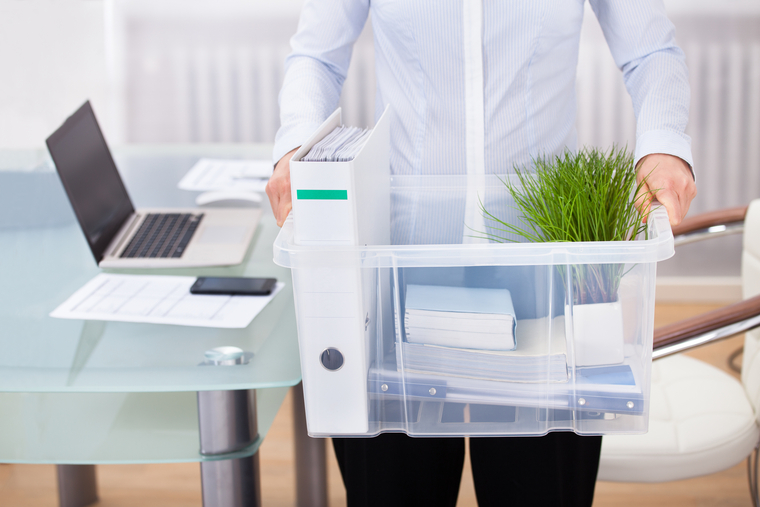Friday Fun Facts – The Average American Moves 12 Times in Their Life

According to the U.S. Census Bureau, the average American moves approximately 11.7 times throughout their lifetime. However, this number varies widely depending on factors such as age, income, and marital status.
Young adults between the ages of 18 and 34 move much more frequently than older adults. Folks between 18 and 34 have an average of 3.3 moves under their belts. In contrast, adults aged 65 and over move much less frequently, with an average of 2.4 moves throughout their lifetime.
Times have changed. While Americans used to move for job opportunities, most people nowadays choose to move for personal reasons. Being closer to families and seeking a better quality of life have become major driving forces behind American relocations.
Of course, the COVID-19 pandemic has also had a significant impact on American mobility. Many people took the chance to re-evaluate their living situations in light of remote work and other changes in the workplace. After all, if you’re going to work from home, why not make your home someplace nice?
Sources: U.S. Census Bureau and MovingFeedback.com
Simple Tips to Make Your Move Easier

Your needs as a homeowner change over time, and you need the right home to fit those needs. Accordingly, it’s highly likely that at some point in your future you will experience another moving day. While moving can be challenging, there are resources to make it easier. If you are remaining in your current area, your Windermere agent can continue to be a valuable resource on communities, schools, utilities, transportation, recreational opportunities, and more.
If you are moving out of the area, your agent can help you with a referral to another reputable agent in your new community. Many agents also have relationships with real estate-related service companies in their area whom they can call upon for information regarding title, escrow, mortgages, temporary housing, and moving services. They can also help guide you in your search as you learn more about new communities and relocation services.
You’ve decided to move. Now what?
Once you have reached your decision, it’s time to gather information, start making decisions and get organized. Begin by creating a “move” file to keep track of your estimates, receipts, and other information. If you’re moving for a job, some expenses may be deductible, so you’ll want the paperwork when tax time comes.
If you are moving out of the area, start researching your new community and ask your agent for help in finding a referral agent in your new area. You’ll also want to determine whether you want to rent first or buy immediately. Your new agent should be able to help you with your decision. Once you know where you’re going, you’re also ready to get estimates from moving companies.
Closing one door, opening another
After you have chosen a moving date and either hired a moving company or reserved a rental truck, it’s time to wrap things up in your old neighborhood and start establishing relationships where your new home is located. This is particularly important if you are moving to a new town/city. You may want to ask your current doctors, dentists, etc. if they have any referrals on care providers in your new location. Be sure to check their recommendations on your insurance company’s online provider search list. Once you arrive, you may also want to ask new coworkers, friends or the school nurse for their recommendations.
Contact your children’s school and/or day care and arrange for their records to be sent to their new school district or day care. Call your insurance agent about coverage en route to your new home and also arrange for insurance in your new home. Remember to contact utility companies to disconnect, transfer or end service in your current home and turn on service in your new home.
You’ll want to file a change of address form with the U.S. Postal Service, either online or at your local office. If you don’t know your new address, have them hold your mail at the post office in your new locale. Don’t forget to cancel or transfer magazine and newspaper subscriptions as well.
If you belong to a health club or other association, contact them about ending or transferring your membership. Some clubs require written notice before cancellation. Finally, contact your bank or credit union to transfer or close accounts; if you have a safe-deposit box, don’t forget to clean it out before you leave.
Starting the countdown
With moving day in sight, it’s time to get organized. Here are a few items to check off your list before you start packing:
- Tie up loose ends. Be sure to send out an email or change of address cards with your new contact information to family, friends, and associates. Return library books and any other borrowed items you may still have.
- Triage your possessions. Determine what you are taking with you; what you are giving away to friends, family, or a favorite charity; and what is going to the dump or recycling center. If you have time, you can hold a garage sale or post items on craigslist.org or ebay.com.
- Clean up. Drain all gas and oil from your mower, other machinery, gas grills, kerosene stoves and lamps, etc., before loading them onto a moving truck. Empty, defrost, and clean your refrigerator at least 24 hours before your move, and prepare other appliances for moving as well.
- Have your car serviced. This is especially important if you are driving to your new home.
Packing strategies
If you are doing your own packing, start collecting boxes and/or buy them from your movers. It may take a few days to do your packing, so be sure to pack non-essential items first and label them carefully. If you have any valuables, it’s recommended that you take them with you as opposed to packing them. You risk the chance of losing those items if they’re packed away in boxes. It’s also smart to take along a box of essentials, including items such as toilet paper, paper towels, tape, soap, scissors, pens, paper, and your toiletries. That way you won’t have to track these items down once you’ve arrived in your new home.
For more information on how to make your move easier, visit our Moving Tips page here: How can I make moving easier?
You’ve Moved into Your New Home. Now What?


Congratulations on your new home! You made it through the arduous process that is buying a new home. Now it’s time to take on the task of moving in.
You did your research about the neighborhood and you feel like you know the home like the back of your hand. However, there are some things to do as you move in to protect your newest investment, and yourself, from the unknown variables in and around your home.
Change the locks garage door codes
Previous owners might have changed the locks, but they may not know who all has a key or a code to open your garage, especially neighbors who they trusted to watch their place while they were away. Changing the codes and locks on all the doors ensures that you have complete control over entry to your home
Check or Install Fire and Carbon Monoxide Detectors
If the home already has fire and carbon monoxide devices, make sure they are in working order by testing each one with the tester button. Keep a note of when to replace them as well.
If they don’t have them, install a device in each sleeping room, as well as common areas like the living room or kitchen. Hallways are a great place to cover multiple rooms with one detector as well.
Install a security system
Enjoy total peace of mind with a new security system. Meet with a consultant on the best ways to protect your home for a system that works best for you and your lifestyle.
There are also app-connected systems that you can set up yourself that notify you of movement on the cameras or doors and windows opening.
Meet the neighbors
Build a sense of community and get to know the lay of the land by knocking on neighbors’ doors to get to know them. Bring a small gift as a “thank you” for dealing with the moving trucks. This is a great initial step for figuring out who you can trust to watch things while you’re away should you need a helping hand in the near future.
These are just a few ideas on what you should do as soon as you move in. What are some things you do, or suggest to friends and clients on move-in day?
Moving on up!

 Moving is stressful, whether it is across town or cross-country. Once you have closed on your house, the reality of packing, moving, and setting up a new home can become overwhelming. While no list can make a move “stress-free”, planning ahead and staying organized can help make your move a little smoother. Here is our list of tips:
Moving is stressful, whether it is across town or cross-country. Once you have closed on your house, the reality of packing, moving, and setting up a new home can become overwhelming. While no list can make a move “stress-free”, planning ahead and staying organized can help make your move a little smoother. Here is our list of tips:
Getting started:
· Once you know your prospective move date set up a quick timeline to make sure you can get all the important tasks done and ready in time for your move.
· Consider how much stuff you have by doing a home inventory. This can help you decide whether you need to hire movers to help you or if you will be managing your move on your own. Many moving companies supply inventory lists to help you assess the size of truck you will need. You can use your list as double duty for insurance purposes later.
· As soon as you decide how you will be moving, make your reservations. In general, moving companies and truck rental services are over-booked at the beginning and very end of the month. If you are planning on hiring a moving company, contact a few in your area for a price quote. To find companies ask your real estate agent, family, or friends, and consult online reviews. It is also a good idea to request a quote and compare companies.
Preparing for your move:
· Moving is a great opportunity to get rid of clutter, junk, or outdated items. Set aside some time to sort through your closets, storage spaces, files, drawers, and more. Go through cluttered areas and organize items by “keepers”, “give-aways” and “garbage”. You will have less to pack and an opportunity to update after you move. Contact a local nonprofit organization for your donations; some will arrange to pick up larger donations like furniture. If you have items of value, eBay or craigslist are good options.
· Changing your address is one of the more tedious tasks in the moving process. You will need to change your address with the United States Post Office. You can find the online form here: https://moversguide.usps.com/icoa/icoa-main-flow.do?execution=e1s1.
· You will also need to change your address with each account you have. Here is a list to get your started:
· Employers
· Bank(s)
· Utilities (Electric, Water/Sewage, Oil/Gas)
· Cable/ Telephone
· Cell phone service
· Credit Cards
· Magazine subscriptions
· Insurance companies (auto, home/renters, health, dental, vision, etc.)
· Pharmacy
· Other personal services
Let the packing begin:
· Before you start packing, it may help to visualize where everything you have will go. Perhaps furniture will fit better in a different room? Consider the floor plan of your new home and figure out what will go where. This will aid in packing and labeling as you box everything up.
· Use a tool like floorplanner.com to plan where furniture and items will go.
· When it comes to packing you have some options. You can work with a service that provides reusable boxes for moving or you can reuse or purchase cardboard boxes. Make sure you have enough boxes, packing tape, dark markers, and packing paper.
· Pack rooms according to your floor plan. Label boxes with contents and room. This will make it easier to unpack your home, knowing where everything is going.
· Real Simple magazine has some great tips on packing for your move.
· If you have to disassemble any of your furniture, make sure you keep all the parts and directions together.
· Make sure you set aside your necessities for the day you move. Being tired and unable to take a shower or make your bed can be hard at the end of a long moving day. Here are some ideas of what you may like to pack in your “day-of-move” boxes.
· Clean linens for the beds, pillows and blankets
· Clean towels
· Shower curtain, liner and hooks
· Toiletries, hand soap, tooth brush, etc.
· Disposable utensils, cups, napkins, etc
· Rolls of toilet paper
· Snacks and water
· Change of clothes
· Tools for reassembling furniture, installing hardware, and hanging photos
Making your move
· Come up with a game plan with your family, so everyone has a role and a part to play
· Once the house is empty, do a once over on your old place to make sure it is clean for the next owners/occupants. Here is a useful checklist for cleaning.
Warming your new home
· Once you have settled into your new home, warm it up by inviting friends and family over to celebrate. Here is a great infographic about housewarming traditions and symbolism.
· Announce your move to far-away friends and family through moving announcements to make sure you stay on the holiday card mailing list.
Do you have any other tips or advice for achieving a smooth move?
For more information on the Windermere Evergreen team please contact us here.
 Facebook
Facebook
 X
X
 Pinterest
Pinterest
 Copy Link
Copy Link






 Moving is stressful, whether it is across town or cross-country. Once you have closed on your house, the reality of packing, moving, and setting up a new home can become overwhelming. While no list can make a move “stress-free”, planning ahead and staying organized can help make your move a little smoother. Here is our list of tips:
Moving is stressful, whether it is across town or cross-country. Once you have closed on your house, the reality of packing, moving, and setting up a new home can become overwhelming. While no list can make a move “stress-free”, planning ahead and staying organized can help make your move a little smoother. Here is our list of tips: